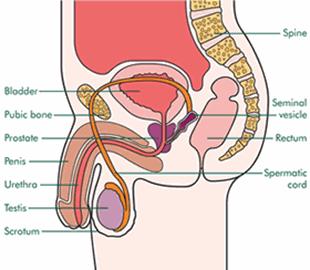The number of cases of prostate cancer diagnosis has increased but early detection and effective treatment have improved the mortality rate.

What is the Prostate?
A small walnut sized gland that makes up part of the male reproductive system.
Where is the Prostate?
The prostate is at the neck of the bladder. It surrounds the urethra which is the tube that carries urine out of the body.
What is Prostate Cancer?
Prostate cancer is the most common cancer in men in the UK (Cancer Research UK) and Guernsey (South West Public Health Observatory). One man dies every hour of the disease in the UK. It is when the cells of the prostate replicate uncontrollably forming a tumour.
Symptoms
- Need to urinate more often than normal, especially at night
- Delayed or slowed start when needing to urinate
- Having an unusually weak stream of urine
- Straining when urinating
- Having difficulty emptying your bladder
- Blood in urine or semen
- Pain when ejaculating or urinating
- Pain or lump in the back passage (like you have sat on a golf ball)
- Pain or stiffness in your lower back or hips
How can you get checked?
If you have any symptoms or concerns speak with your doctor.
Your doctor may carry out a digital rectal examination to feel your prostate and organise a blood test. The blood test is checking for your level of prostate specific antigen (PSA) in your blood, your doctor will explain this to you and what it means.
What increases your risk?
- Age (men over 50 have a higher risk)
- Ethnicity (In the UK African Caribbean men are 3 times more susceptible)
- Family history of the disease
The Prostate Gland
What can decrease your risk?
- Eat a healthy diet which includes lots of colourful vegetables and fruit
- Reduce red meat and avoid processed meat (ham, bacon, salami, corned beed etc.), opt for lentils, beans or fish
- Be active, aim to do 30 minutes of moderate to vigorous activity every day.
- Maintain a healthy weight.
